Do you ever wonder why your dog moves around so much when they’re sleeping? It seems like they can never just stay in one spot!
In this blog post, we will discuss the reasons why dogs move around while sleeping, and we will also provide some tips for helping them get better sleep.
Dogs move from spot to spot while sleeping because they don’t associate one place with sleeping when they are house pets.
Understanding Dog Sleeping Behavior
Dog sleeping behavior can be influenced by various factors such as age, breed, health status, and daily activities, which is why it’s common for dogs to have different sleep patterns compared to humans.
Dogs, similar to humans, have a sleep cycle that includes stages of wakefulness, rapid-eye-movement (REM) sleep, and non-rapid-eye-movement sleep.
However, the duration of these stages varies greatly. Puppies and older dogs tend to require more sleep than young adults, while certain breeds may need more rest than others.
Also, a dog’s health condition can significantly affect their sleep; for instance, a dog with arthritis might sleep more to escape the discomfort.
As a veterinarian, I’ve seen a wide range of sleep behaviors in dogs. Some dogs sleep soundly through the night, while others are light sleepers who wake up at the slightest noise.
It’s not uncommon for dogs to dream, evident by twitching, whimpering, or running movements during their sleep.
Why Does My Dog Move From Spot To Spot While Sleeping

Your dog might move from spot to spot while sleeping due to reasons like discomfort, changes in temperature, seeking a quieter location, or underlying health issues such as sleep disorders or pain.
Even though this behavior is pretty normal, here is why your dog likes to move from spot to spot while sleeping.
1. Natural instinct

Dogs switch spots while sleeping as a part of their natural instinct because in the wild they had to move regularly to stay safe. This allowed them to remain vigilant against threats and kept the predators at bay.
Dogs often rotate sleeping spots throughout the day and night. Dogs have evolved with instincts that motivate them to protect their personal space which requires that they take time to scan and assess their sleeping environment regularly.
This habit of changing sleeping positions can also be identified in nature as predators must remain vigilant while asleep so they don’t become an easy target for their prey.
While it seems worrisome at first, this behavior is simply a natural consequence of hardwired survival instincts.
2. The sleeping area is not comfortable

While some dogs may have that special spot they always choose, when it comes to moving from one sleeping area to the next, there is typically a solid reason: discomfort. If a dog’s bedding isn’t soft enough or the floor is too cold, an animal’s natural instinct will take over and push the pooch into finding somewhere better.
Creating a comfortable sleeping area for your furry friend is important, as it will help them feel secure and protected in their space says NewtonBaby.
Start by finding the right size bed, one that is big enough for them to fully stretch out. You may also want to consider memory foam or an orthopedic paw-friendly model, both of which can provide extra support and comfort.
Place the bed in a quiet spot where your pup can have privacy and some peace and quiet; avoid too much sunlight, noise, or drafts.
For added coziness, provide plenty of plush blankets they can snuggle up with on cold nights. Finally, use a favorite toy to show them that this is their special place to sleep and that you’re paying close attention to their needs.
3. Feeling cold/hot
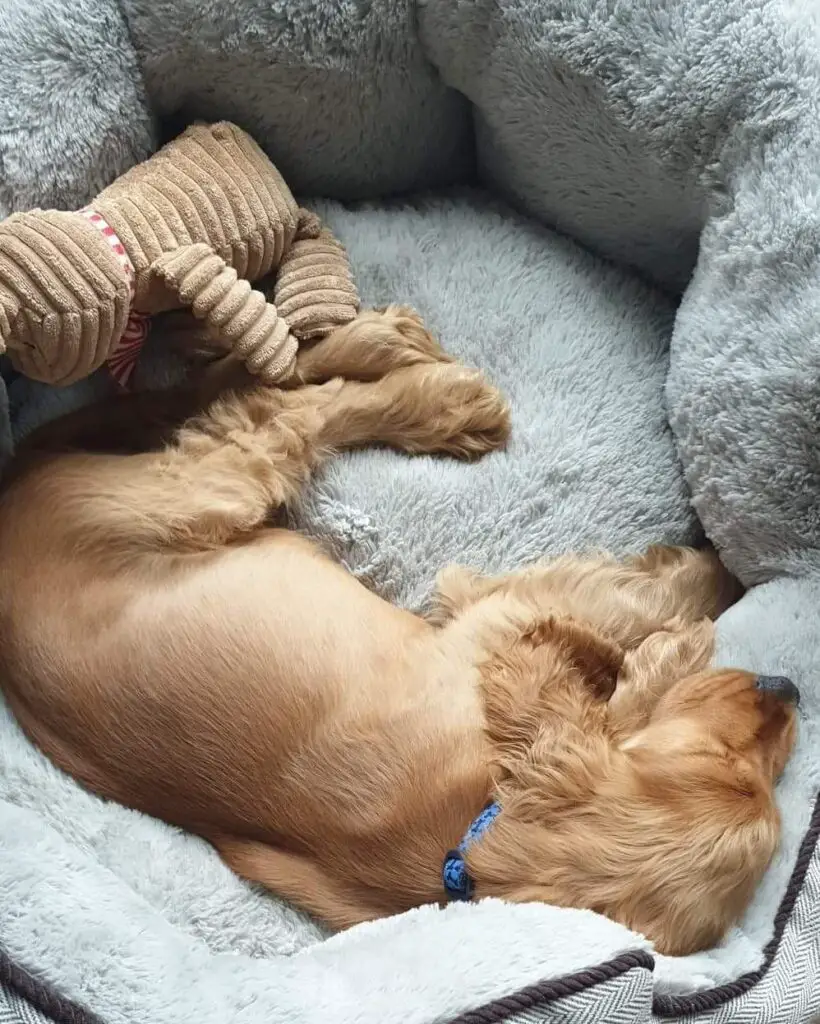
Dogs are incredibly adaptive creatures, and one of the ways that show is their sensitivity to hot and cold temperatures. If the temperature isn’t quite right for them, you might see your pup moving from spot to spot in order to find somewhere a bit more comfortable.
They’ll always seek out a warm or cool place depending on what the season is like, using doorways, the shade of a tree or furniture, blankets, tile floors… whatever they can find! This can be maddeningly adorable to watch as they search around for comfort and finally settle down when they find it says AKC.
4. Has fleas that won’t let him sleep
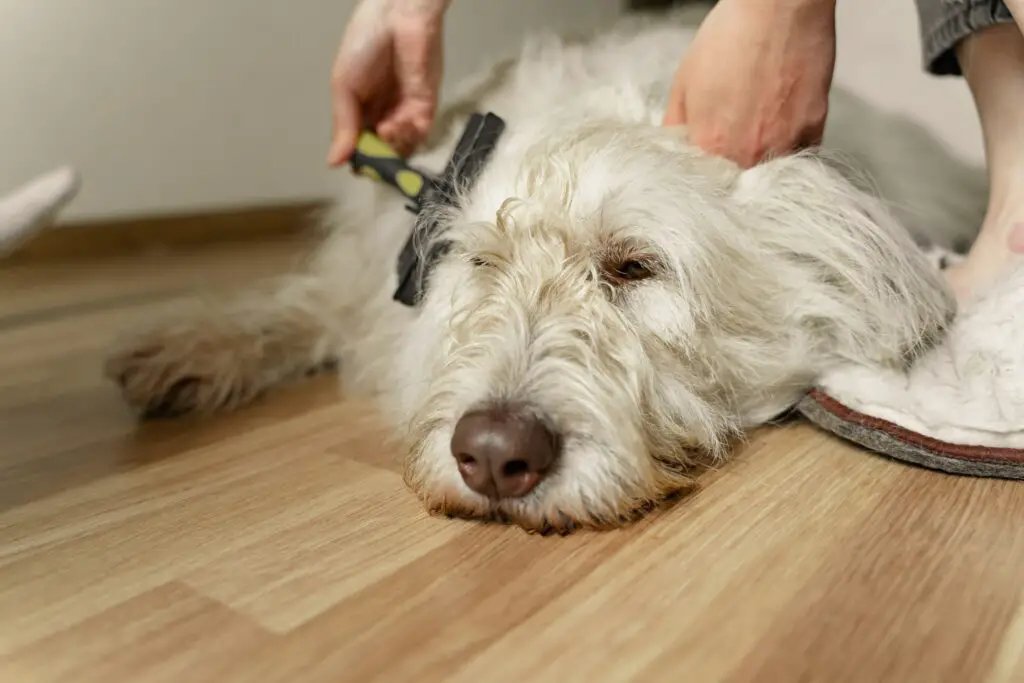
Getting a good night’s rest is something every dog deserves, but when your pooch has fleas, it can make it really difficult to settle into one spot and drift off into dreamland.
As the fleas bite and irritate them, they may jump up and move to new spots while they’re sleeping in an attempt to get away from those pesky fleas.
It’s a tough situation for both the dog and its owners; not only will have difficulty getting quality rest, but you’ll need to address the problem in order to keep your pup comfortable.
The best advice is often to use natural approaches like essential oils or diatomaceous earth instead of chemical treatments as these may cause more harm than good in the long run.
Ultimately, protecting your pup from fleas is a must so everyone can enjoy a peaceful slumber night after night as per DogTime.
5. Hunger

Many dogs have habits of moving from spot to spot while sleeping, which can often be attributed to hunger. To alleviate hunger-related movement, it’s important for pet owners to make sure their furry friend is getting enough to eat.
Dogs that are well-fed tend to stay in one place when they’re snoozing – a benefit for any dog owners who share a bed with their pup! Feeding your dog the appropriate amount of food also prevents other health issues they may face.
When dogs move around while sleeping due to hunger, it could possibly mean they’re not being fed adequately or even missing meals altogether. As pet owners, we have an obligation to provide our four-legged pals with the best care and nutrition available says NCBI.
6. Distractions (people walking, noisy neighbors, etc)
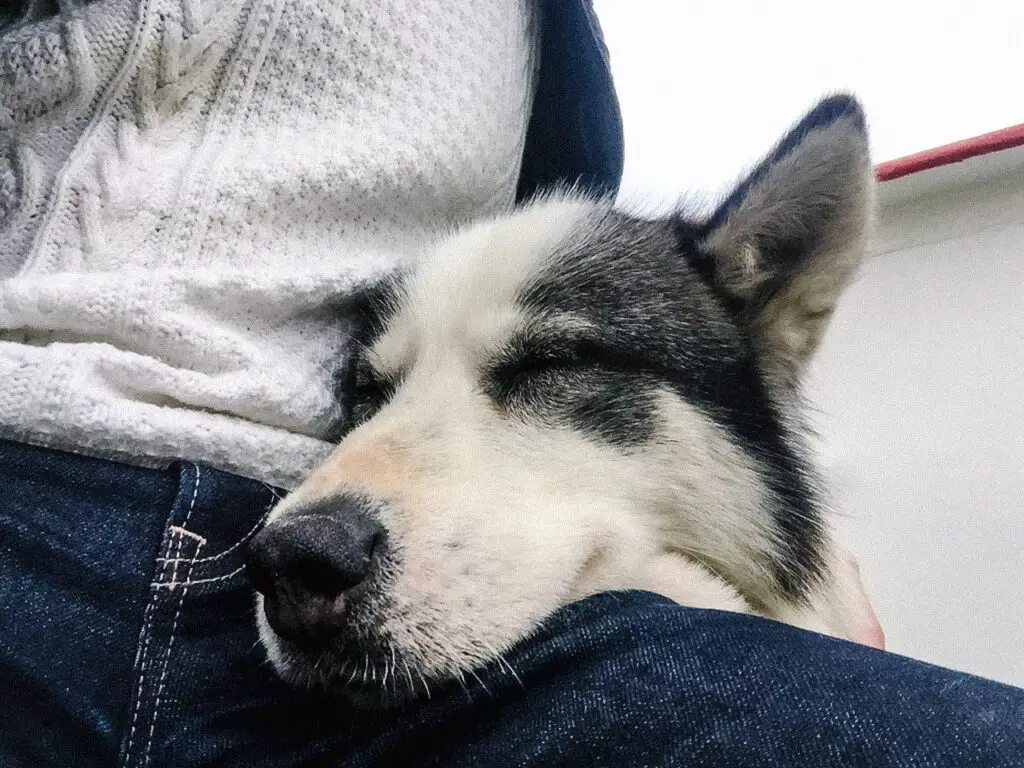
Many pet parents are familiar with the sight of a sleeping dog, who contently moves from one spot to the next without waking up. This habit is often caused by a range of distractions; from loud noises outside to other people and animals entering the room, or even just a light switch turning on and off.
Although it might be amusing to watch these spontaneous changes in sleeping spots, it’s important for pet owners to ensure that their fur babies have a comfortable place to rest their heads each night says PetMD. Providing a consistent, noise-free sleep environment can help keep your pup well-rested and healthy!
7. Your pup is dreaming

A dog that moves from spot to spot while sleeping may be physically acting out their dreams. This is a phenomenon known as “dream running” or “sleep running.”
During the REM (Rapid Eye Movement) stage of sleep, dogs, like humans, can have vivid dreams.
These dreams could involve activities such as running, playing, or chasing something.
In some cases, dogs might move their legs, twitch, or even get up and move around as if they’re actually performing these actions in their dream.
8. High-energy breeds

A high-energy dog moving from spot to spot could be displaying their natural active behavior and need for physical and mental stimulation.
High-energy dogs, like Border Collies or Labradors for instance, have a lot of physical and mental energy to expend.
These breeds were originally developed for jobs that required constant activity and problem-solving.
When they don’t get enough exercise or stimulation, they might start pacing or moving around restlessly as a way to burn off some of that pent-up energy.
9. Sleep disorders
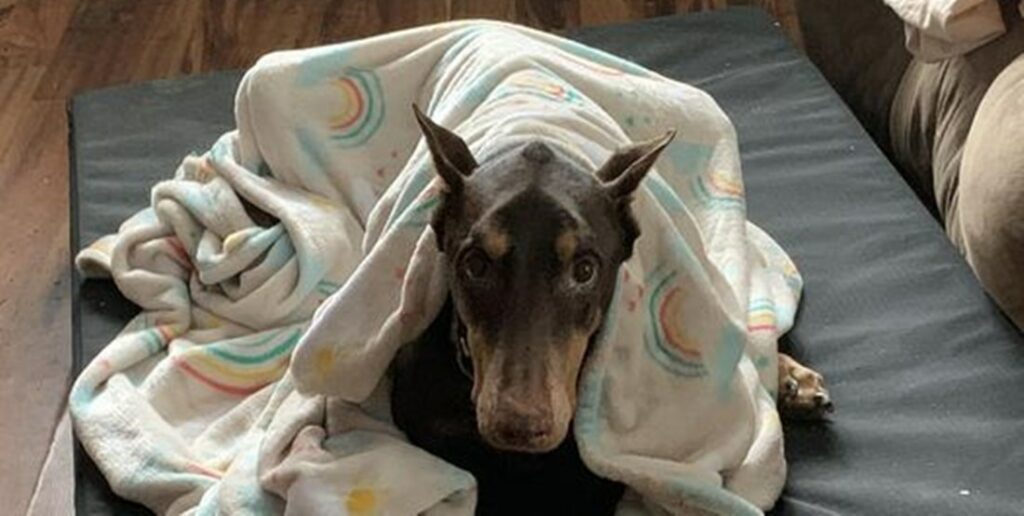
A dog with a sleeping disorder moving from spot to spot could be experiencing discomfort or restlessness, which are common symptoms of various sleep-related issues.
Sleep disorders in dogs can range from insomnia and sleep apnea to narcolepsy and restless leg syndrome.
These disorders often result in interrupted, poor-quality sleep. If a dog is unable to settle into a deep, restful sleep, they may move around frequently in an attempt to find a comfortable position or place to rest.
For instance, dogs with sleep apnea may change positions often to ease their breathing. Similarly, dogs with pain-related insomnia might move around to alleviate discomfort says Vet Med.
10. Early stages of dementia
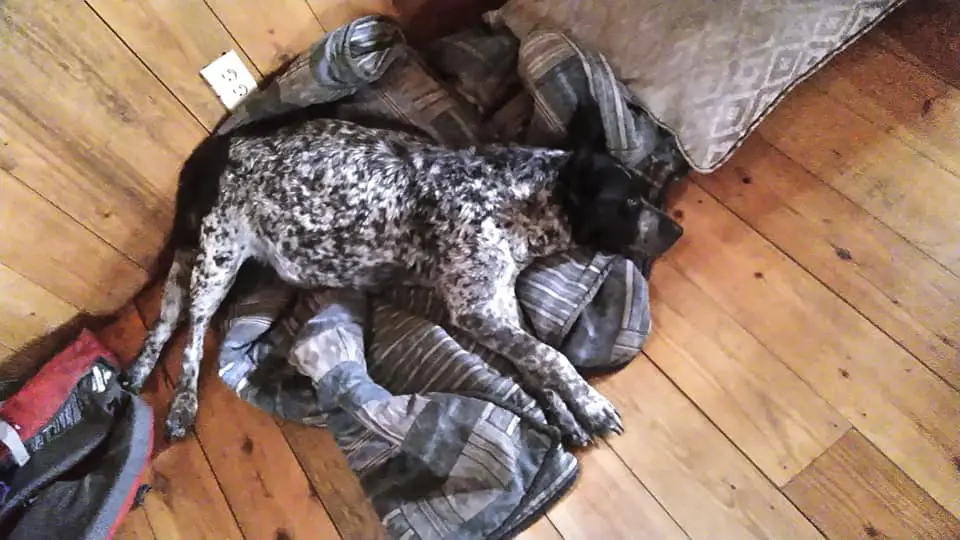
A dog with early stages of dementia, also known as Canine Cognitive Dysfunction (CCD), might move from spot to spot due to confusion, restlessness, or changes in behavior patterns.
Canine Cognitive Dysfunction can affect a dog’s perception, memory, learning, and awareness. Dogs with CCD may forget familiar routes or get disoriented even in familiar surroundings. This confusion can lead them to wander aimlessly or pace back and forth.
Restlessness, particularly during the night, is another common symptom of CCD. Dogs with this condition often experience changes in their sleep-wake cycle, leading them to be active or anxious when they should be resting.
Changes in behavior patterns are also common in dogs with CCD. They may exhibit repetitive or compulsive behaviors, such as moving from spot to spot without any apparent reason.
11. Separation anxiety
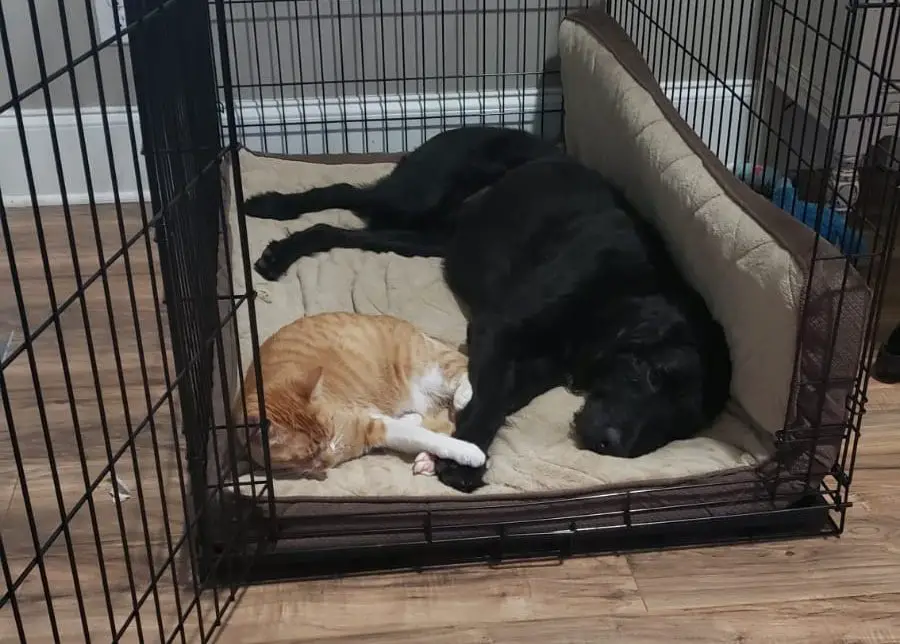
A dog with separation anxiety might move from spot to spot due to stress, restlessness, and a desire to find their owner.
Separation anxiety is a condition where a dog exhibits distress and behavior problems when separated from their primary attachment figure, usually their owner.
This can lead to a variety of symptoms, including pacing or moving around restlessly.
One reason for this movement is stress. Dogs with separation anxiety can become extremely anxious when left alone, leading to behaviors like pacing, circling, or constantly moving from one place to another as a way to cope with their anxiety.
Here is a clinical review done on sleeping disorders in dogs that you might find interesting to read.
How To Stop a Dog From Moving Spot To Spot While Sleeping
Here is how to stop a dog from moving spot to spot while sleeping:
Provide a comfy and cozy bed
Your dog’s sleeping area should be comfortable and supportive for their body. Make sure the bed is the right size for your dog and is made of soft, comfortable material.
Keep the temperature comfortable
Ensure that your dog’s sleeping area is neither too hot nor too cold. This will help them sleep peacefully and prevent them from moving around too much in search of a comfortable spot.
Treat fleas and ticks
If you suspect that flea or tick infestation is causing your dog to move around too much while sleeping, make sure to treat the problem promptly.
Create a peaceful environment
Keep your dog’s sleeping area away from loud noises, bright lights, and distractions. This will help them relax and sleep comfortably.
Establish a routine
Stick to a regular schedule of feeding and exercise, which will help your dog maintain a healthy sleep routine as well.
Remember, dogs have different personalities and habits, so it’s best to observe and understand your pet’s behavior to ensure they are comfortable and happy.
Should I Wake Up My Dog If They Move While Sleeping
If your dog is moving in their sleep, it’s generally best to let them continue sleeping undisturbed, as waking them can disrupt their important REM sleep cycle and potentially cause confusion or distress.
When dogs move in their sleep, they’re often in the REM (Rapid Eye Movement) stage of sleep, which is when dreaming occurs. Just like humans, dogs need this deep sleep for optimal health. Disrupting a dog during REM sleep can result in serious consequences such as anxiety or disorientation.
Dogs may twitch, move their paws, or even make noises while they’re dreaming. It’s important to remember that these movements are usually normal and don’t necessarily mean your dog is having a bad dream or nightmare. In fact, these movements could be a sign of a good dream – perhaps they’re chasing a squirrel or playing fetch!
From my experience as a vet, I’ve seen numerous instances where dogs were startled or confused when woken up suddenly from a deep sleep. This can lead to unnecessary stress for your pet.
However, if your dog seems distressed while sleeping – for instance, they’re whining, crying, or appearing unusually restless – it might be appropriate to gently wake them. In such cases, it’s best to use your voice to comfort them rather than touch them, as they could be startled.
When To Seek Veterinary Assistance For Dog Sleeping Issues
Veterinary assistance should be sought for dog sleeping issues when there are sudden changes in your dog’s sleep pattern, or if they show signs of discomfort, restlessness, difficulty breathing, or unusual behaviors during sleep.
Changes in a dog’s sleep pattern can sometimes be a symptom of underlying health issues. For instance, excessive sleep or lethargy could indicate illness, while frequent waking or restlessness could signal pain or discomfort.
Difficulty breathing during sleep is a serious concern that requires immediate veterinary attention as it could be a sign of conditions like heart disease or obesity.
Unusual behaviors during sleep such as excessive whimpering, twitching, or aggression can also be cause for concern.
In my years of practice as a veterinarian, I’ve seen many cases where changes in a dog’s sleep pattern were the first sign of a more serious health issue.
One such case was a Labrador Retriever that started sleeping excessively. Upon examination, we discovered he had hypothyroidism.
In another case, an otherwise healthy young Border Collie began waking up frequently during the night, which turned out to be due to a urinary tract infection.
These experiences highlight the importance of monitoring your pet’s sleep habits and seeking veterinary assistance when changes occur.
FAQs
Q: Is it normal for dogs to change sleeping positions frequently?
A: Yes, it is completely normal for dogs to change sleeping positions frequently. Just like humans, dogs have their own preferences for comfort while sleeping and may shift around to find the best spot.
Q: What are some common reasons why dogs move while sleeping?
A: Common reasons why dogs move while sleeping include adjusting their body temperature, alleviating pressure points, searching for a more comfortable position, instinctual behaviors, or responding to external stimuli such as noises or movements.
Q: Should I be concerned if my dog moves a lot while sleeping?
A: Unless your dog is showing signs of distress or discomfort, there is generally no cause for concern if they move a lot while sleeping. It is their way of finding the most comfortable sleeping position.
Q: Can dogs have dreams?
A: Yes, dogs can have dreams just like humans. They may twitch, whimper, or move their paws as they experience different sleep stages, including the REM (rapid eye movement) phase where dreaming occurs.
Q: Why does my dog make noises while sleeping?
A: Dogs may make noises such as whining, barking, growling, or even howling while sleeping. These noises can be a result of dreaming, experiencing physical discomfort, or responding to stimuli in their sleep environment.
Q: How can I help my dog have a better sleep?
A: To help your dog have a better sleep, provide a comfortable and quiet sleeping environment, ensure they have a suitable bed or blanket, establish a consistent sleep routine, and engage them in regular exercise to help tire them out before bedtime.
Q: Can excessive movement during sleep indicate a health problem in dogs?
A: Excessive movement during sleep can sometimes indicate a health problem in dogs. If your dog’s sleep movements are accompanied by signs of pain, restlessness, difficulty breathing, or other unusual symptoms, it is recommended to consult with a veterinarian for further evaluation.
Q: How can I tell if my dog is having a nightmare?
A: It can be challenging to determine if a dog is having a nightmare as they can’t tell us directly. Signs such as intense twitching, vocalizations that seem distressed, or rapid eye movement (REM) during sleep may suggest the possibility of a nightmare or intense dream.
Conclusion and final thoughts
In conclusion, it is clear that there are a variety of reasons why dogs may move from spot to spot while sleeping.
It could be due to a combination of physical comfort, emotional security, and the need to stay alert to potential predators.
Whatever the cause may be, it is important for pet owners to recognize and respect their pup’s behavior.




